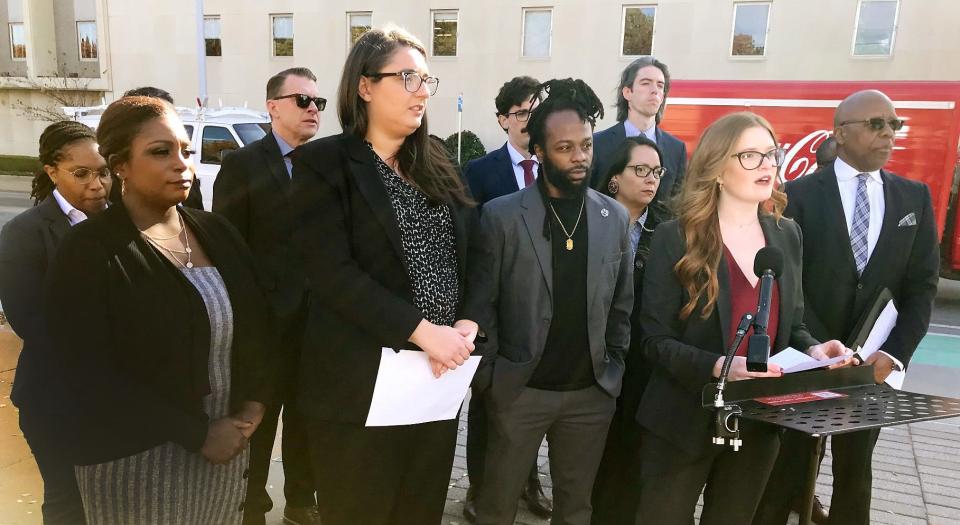For the second time since filing their lawsuit more than two and a half years ago, plaintiffs in a case challenging an Oklahoma law against the “critical race theory” have asked a federal judge to follow the procedure.
The case involves House Bill 1775, which bans the teaching of certain racial and gender topics in Oklahoma classrooms. Gov. Kevin Stitt signed the bill into law in May 2021 and the federal lawsuit followed in October. The challenge claims the law violates the First and Fourteenth Amendments to the U.S. Constitution by suppressing speech and discriminating against minority and LGBTQ+ students.
Following the latest request from attorneys for the Black Emergency Response Team and other plaintiffs, filed in a lawsuit on Friday, U.S. District Judge Charles Goodwin — who heard oral arguments in the case on Dec. 4 — immediately scheduled a status conference. held by telephone on June 7. In a three-paragraph order, also issued Friday, Goodwin told the parties in the case to notify his courtroom deputy “of the telephone number at which they may be contacted.”
The plaintiffs have asked Goodwin to discuss four items: their request for a preliminary injunction blocking enforcement of the law, filed on October 29, 2021; motions to dismiss filed by two of the defendants, the University of Oklahoma and Edmond Public Schools, both filed on November 23, 2021; and Defendants’ Motion for Judgment on the Pleadings, filed on January 25, 2023. In that motion, Defendants said: “This Court must deny Plaintiffs’ invitation to undo Oklahoma’s democratic and representative political process. Instead, it should dismiss the case for failure to state a plausible claim.”
In the most recent motion, the plaintiffs noted how long both sides have had to wait for a decision from Goodwin.
“(T)ree of these motions have been pending for more than two years, and another motion has been pending for more than a year,” according to the request filed Friday. “The Court entered oral argument on the motions on December 4, 2024. However, to date, the Court has not ruled or informed the parties of the pending application.”
The motion was signed by eleven attorneys representing the plaintiffs. Two of them, Adam Hines and Megan Lambert, work at the American Civil Liberties Union Foundation of Oklahoma, while the rest are based in New York or Washington, DC. Oklahoma Attorney General Gentner Drummond’s office is defending the law.

The slow progress of the case also led to earlier questions from plaintiffs
Questions about the pace of the case have now been raised twice by the plaintiffs in less than a year. In a motion filed in late September last year, the groups suing the state noted that the request for an injunction had been pending for nearly two years and that all written arguments from both sides regarding the injunction had been pending for 19 months had been submitted previously.
In the September motion, they noted that a request they made in August for a status conference had gone unanswered. They said they had two choices: ask Goodwin to resign or appeal to the 10th U.S. Circuit Court of Appeals. Within days, Goodwin scheduled a telephone status conference and on December 1 set a hearing for oral arguments three days later.
The December hearing lasted more than two hours, during which Goodwin raised the idea of sending the case to the Oklahoma Supreme Court, but gave no indication when he would rule on the lawsuit.
The plaintiffs again raised the idea of appealing to the 10th U.S. Circuit Court of Appeals as part of a May 3 filing titled “Plaintiffs’ Notice of Pending Motions.” In that filing, one subsection was titled: “Further delay in resolving pending motions would require Plaintiffs to seek a writ of mandamus from the Tenth Circuit.”
Goodwin, who was nominated by former President Donald Trump, was confirmed in 2018 despite receiving a rare “not qualified” rating from the American Bar Association’s Judicial Review Committee. A former chairman of that ABA committee said Goodwin’s work habits as a federal magistrate, “including his frequent absences from the courthouse until mid-afternoon, raised doubts among a majority of the standing committee members as to Magisterial Judge Goodwin’s ability to meet the requirements. from a federal judge.”
Goodwin told the Senate Judiciary Committee in 2017, when he was a magistrate, that he often worked from home when writing opinions and that he was shocked and disappointed by the ABA’s rating.
This article originally appeared in Oklahoman: Oklahoma lawsuit over critical race theory law pending after 2.5 years







